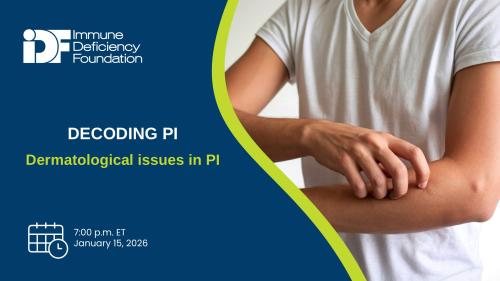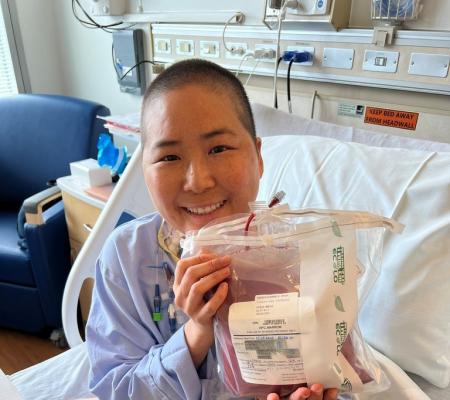
-
Understanding primary immunodeficiency (PI)

Understanding PI
The more you understand about primary immunodeficiency (PI), the better you can live with the disease or support others in your life with PI. Learn more about PI, including the various diagnoses and treatment options.
-
Living with PI
-
Addressing mental health
-
Explaining your diagnosis
- General care
- Get support
- For parents and guardians
-
Managing workplace issues
- Navigating insurance
-
Traveling safely

Living with PI
Living with primary immunodeficiency (PI) can be challenging, but you’re not alone—many people with PI lead full and active lives. With the right support and resources, you can, too.
-
Addressing mental health
-
Get involved

Get involved
Be a hero for those with PI. Change lives by promoting primary immunodeficiency (PI) awareness and taking action in your community through advocacy, donating, volunteering, or fundraising.
-
Advancing research and clinical care
-
Research Grant Program
-
Consulting immunologist
-
Diagnosing PI
-
Getting prior authorization
-
Clinician education
-
Survey research
-
Participating in clinical trials

Advancing research and clinical care
Whether you’re a clinician, researcher, or an individual with primary immunodeficiency (PI), IDF has resources to help you advance the field. Get details on surveys, grants, and clinical trials.
-
Research Grant Program
If you have a primary immunodeficiency (PI), visit a dermatologist at least annually because visible skin problems can be important for the diagnosis and management of health issues, said Dr. Edward Cowen in a 2024 PI Conference session, “Dermatology issues in the PI patient.”
Cowen, senior clinician head at the National Institutes of Health (NIH) Dermatology Consultation Service specializes in evaluating rare and challenging dermatologic conditions. He described how to find the appropriate dermatologist and discussed key dermatology concepts for the PI population.
“Because the skin is an external organ that you can all see, I want to try to empower you in terms of what you can do to take care of your skin, to help diagnose your skin condition, and to be as proactive as possible,” said Cowen.
Skin cancer is a primary concern. One in three people of European descent will develop basal cell carcinoma and the rate is higher in those with PI, said Cowen. Having a PI also makes you more susceptible to squamous cell carcinoma, an aggressive form of skin cancer.
“This is a big problem in the general population and even more so in the PI setting,” said Cowen.
Other reasons to seek out a dermatologist include:
- Drug hypersensitivity and management of long-term side effects.
- Autoimmune skin conditions and damage caused by lupus, vitiligo (pigment loss in the skin), and alopecia areata (spot baldness).
- Inflammatory skin diseases like eczema and dermatitis.
- Education on how to prevent skin cancer and infection.
When choosing a dermatologist, seek a pediatric dermatologist for children with PI or a medical dermatologist for adults with PI. Choose a provider who performs a full skin exam, can address lesions of concern, and makes an accurate diagnosis through biopsy, not just a skin swab.
“Find a dermatologist willing to slow down and take the time to listen to your unique concerns… and be aggressive with managing your condition. They need to talk to your doctors and make sure what they are allowed to do, and what’s safe to give you, particularly with systemic treatments,” said Cowen.
“You want a dermatologist who is willing to be educated. You are in many cases going to know more about your condition than the dermatologist.”
Referrals to the appropriate dermatologist may come through your primary care doctor, immunologist, or infectious disease doctor. Also, get recommendations from other patients in the PI community and search for providers on the web, paying special attention to dermatologists at academic medical centers. You may also check the IDF Clinician Finder.
Some common skin infections in both the PI setting and the general population include molluscum contagiosum and warts. Molluscum contagiosum is a viral skin infection most common in children ages 1 to 10 and characterized by white, pink, or skin-toned bumps the size of a pencil eraser that occur anywhere on the body and pose no medical risk. Warts are caused by more than 100 subtypes of the human papillomavirus (HPV), some low-risk and some high-risk. Low-risk HPV is non-cancerous and can result in cutaneous lesions and genital warts. High-risk HPV can lead to pre-cancerous lesions, and tumors in the mouth, genital area, and cervix.
“HPV vaccines are recommended for all individuals, even those with PI,” said Cowen.
Not all skin issues are infections, said Cowen. Those with a suppressed immune system can develop eczema, an excessive immune response, or autoimmunity, in the skin. People with eczema are prone to secondary infections like the bacterial infection impetigo, and ulcers caused by the herpes simplex virus.
Patients can treat eczema with ointments, gentle soaps, and diluted bleach baths, and avoid triggers like certain foods and fragrances. Doctors may also prescribe topical steroids, wet wraps, topical non-steroids, and antimicrobial creams.
Steps you can take to promote skin health include:
- Monitor your skin for new lesions.
- Know the side effects of your medications such as rash, hives, blisters, and photosensitivity.
- Take steps to prevent skin cancer such as wearing sunscreen, a hat, and protective clothing, seeking shade, and limiting sun exposure between 10 a.m. and 4 p.m.
“Lastly, at least once a month when you get out of the shower, take a look at the front and back, at your skin. You're not supposed to be able to diagnose all of the things that we talked about, but if you see something different that doesn't look right or you think has changed, you don't have to wait a full year to see your dermatologist again. Get in sooner and then you could potentially get diagnosed quicker,” said Cowen.
Watch 2024 PI Conference sessions
Missed a session or want a refresher? 2024 PI Conference session recordings are now available!
Browse sessionsTopics
Related resources
Sign up for updates from IDF
Receive news and helpful resources to your cell phone or inbox. You can change or cancel your subscription at any time.





The Immune Deficiency Foundation improves the diagnosis, treatment, and quality of life for every person affected by primary immunodeficiency.
We foster a community that is connected, engaged, and empowered through advocacy, education, and research.
Combined Charity Campaign | CFC# 66309




